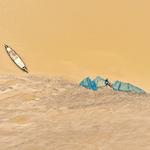How do we tackle climate-related migration? Takeaways from CLIMIG’s March Seminar
<div class="event-icon"></div> <span>Save this event in my Outlook calendar</span>
<div class="event-icon"></div> <span>Save this event in my Google Calendar</span>
On 27 March 2025, the fourth seminar of the CLIMIG initiative’s quarterly series was held in a hybrid format at Bergen Global. The seminar, moderated by CMI's Doctoral Researcher Hanna Geschewski, brought together Bergen-based researchers, including CMI researchers and guest speakers from Norce and UiB, to discuss climate-related migration from different perspectives.
We were delighted to host Erik Kolstad, research professor at NORCE and the Bjerknes Centre for Climate Research, who also holds a part-time position at CMI. As a climate scientist, Erik discussed the uncertainties in climate models related to migration, emphasizing that climate stress is not a direct cause of migration but rather an indirect factor through economic pressures, particularly on agriculture. He highlighted examples from East Africa where unpredictable rainfall patterns have disrupted agriculture, as well as from Syria and Bihar (India) where drought contributed to war and subsequent migration. Throughout his talk, Erik underscored the importance of access to climate services, which have been shown to reduce migration by supporting adaptation efforts and preventing policy miscalculations.
The following two interventions were presented by CMI researchers from the CLIMIG initiative: Are John Knudsen, Research Professor, and Cathrine Talleraas, Senior Researcher.
Are discussed about the Palestinian refugee community in South Lebanon, known as the Jal-Al-Bahar, an informal settlement established in 1948 relying on inshore fishing with wooden boats, where he conducted field interviews. Climate change has exacerbated challenges in the warming Mediterranean, including overfishing and depletion of fish stocks, and these difficulties are further exacerbated by a restrictive environment for Palestinians, where obtaining official fishing permits remains challenging. In this case study, Are linked the climate vulnerability to conflict-induced migration, highlighting how displacement during the Lebanese Civil War has left Palestinian refugees particularly exposed to climate risks due to their inherited vulnerabilities.
Cathrine’s intervention focused on the governance of climate-related migration, sharing insights from her fieldwork in Uganda, where she conducted targeted interviews. Uganda is a country highly sensitive to climate change, where the growing frequency of extreme events has led to significant migration. However, Cathrine explained how there is limited evidence proving a direct link between climate change and migration in Uganda, as factors like community ties also influence migration decisions, challenging the notion of “climate refugee” that oversimplifies migration as solely driven by climate reasons. She also reflected on the concept of migration as adaptation or diversification strategy for Ugandan families and showed how the varied narratives found in policy documents create uncertainty about whether migration is perceived as a positive or negative phenomenon in Uganda.
In the final part of the seminar, we were pleased to hear an intervention from Johannes Servan, Senior Academic Librarian at the UiB faculty of Philosophy. Johannes explored the ethical dimensions of climate-induced migration, posing three philosophical questions: who is owned? Who should pay? What is owned? In addressing the first question, he explained how climate change not only drives mobility but also results in immobility, as some people are either unable or unwilling to migrate. To answer the second one, Johannes discussed the international climate finance, referencing the UN’s approach of distributing responsibility based on the "ability to pay" principle. Using Norway as an example, he argued that historically responsible and economically benefiting nations should take accountability, including financial contributions and granting work permits to displaced populations. For the third question, the issues of compensation and support for adaptive measures were taken into debate, emphasizing that, beyond financial compensation, climate loss includes the loss of environmental conditions essential to a way of life, affecting both migrating and immobile populations.

Project
